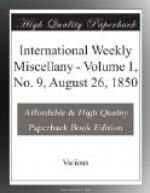This practicalness and readiness of adaptation are instinctive, not voluntary and designed. They are united with the most decided preference for certain opinions and the most earnest averseness to others. Nothing can be less like Talleyrand’s system of waiting for events. He has never, in view of a change which he saw to be inevitable, held himself in reserve and uncommitted. What Webster is at any time, that he is strenuously, entirely, openly. He has first opposed, with every energy of his mind and temper, that which, when it has actually come, he is ready to accept, and make the best of. He never surrenders in advance a position which knows will be carried; he takes his place, and delivers battle; he fights as one who is fighting the last battle of his country’s hopes; he fires the last shot. When the smoke and tumult are cleared off, where is Webster! Look around for the nearest rallying point which the view presents; there he stands, with his hand upon his heart, in grim composure; calm, dignified, resolute; neither disheartened nor surprised by defeat. “Leaving the things that are behind,” is now the trumpet-sound by which he rallies his friends to a new confidence, and stimulates them to fresh efforts. It is obvious that Webster, when contending with all his force for or against some particular measure, has not been contemplating the probability of being compelled to oppose or defend a different policy, and, so, choosing his words warily, in reference to future possibilities of a personal kind: yet when the time has come that he has been obliged to fight with his face in another direction, it has always been found that no one principle had been asserted, no one sentiment displayed, incompatible with his new positions. This union of consistency with practicability has arisen naturally from the extent and comprehensiveness of his views, from the breadth and generality with which the analytical power of his understanding has always led him to state his principles and define his position. From the particular scheme or special maxim which his party was insisting upon, his mind rose to a higher and more general formula of truth.
Owing to the same superior penetration and reach of thought, the gloom of successive repulses has never been able to paralyze the power which it has saddened. The constitution has been so often invaded and trampled upon, that to a common eye it might well seem to have lost all the resentments of vitality. But Webster has distinguished between the constitution and its administration. He has seen that the constitution, though in bondage, is not killed; that the channels of its life-giving wisdom are stuffed up with rubbish, but not obliterated. He has been determined that if the rulers of the country will deny the truth, they shall not debauch it; if they depart from the constitution, they shall not deprave it. He has been resolved, that when this tyranny of corruption shall be overpast, and the constitution draws again its own free breath of virtue, truth and wisdom, it shall be found perfect of limb and feature, prepared to rise like a giant refreshed by sleep.




